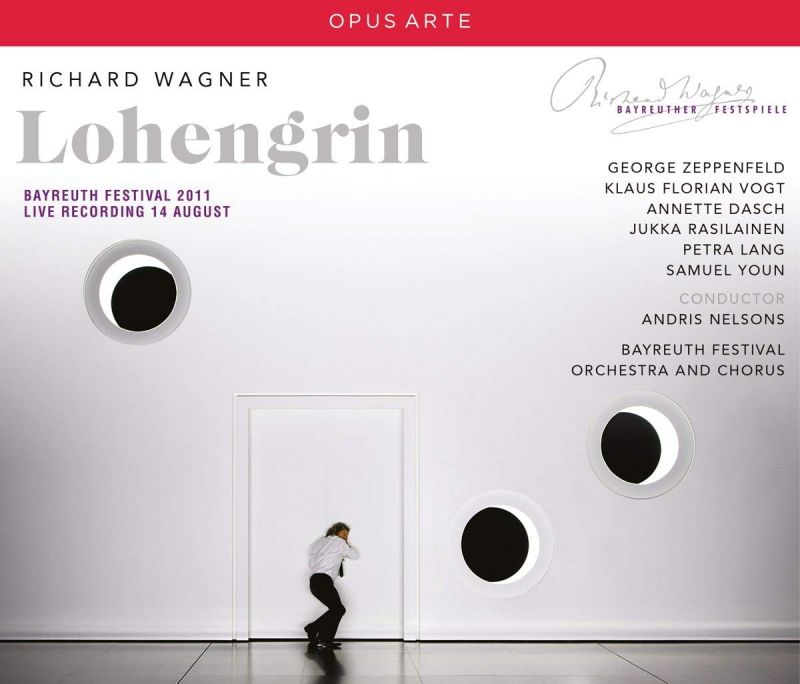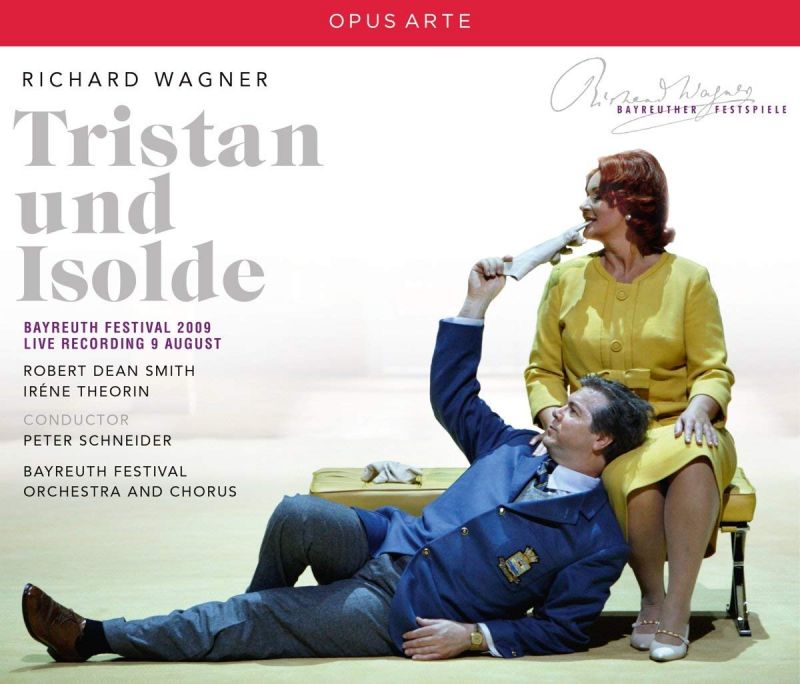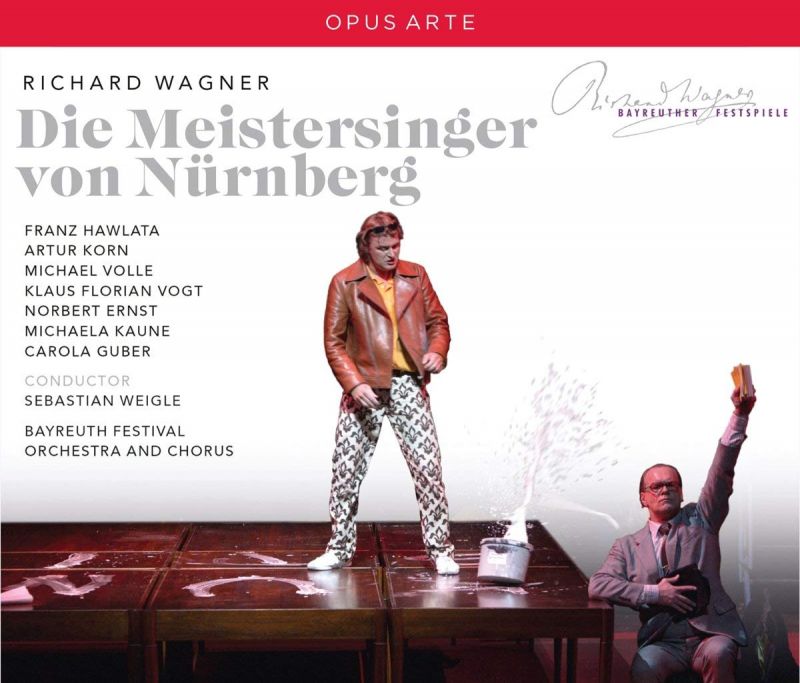WAGNER Meistersinger; Tristan und Isolde; Lohengrin
View record and artist detailsRecord and Artist Details
Composer or Director: Richard Wagner
Genre:
Opera
Label: Opus Arte
Magazine Review Date: 09/2018
Media Format: CD or Download
Media Runtime: 200
Mastering:
DDD
Catalogue Number: OACD9034D

Tracks:
| Composition | Artist Credit |
|---|---|
| Lohengrin |
Richard Wagner, Composer
Andris Nelsons, Conductor Annette Dasch, Elsa von Brabant, Soprano Bayreuth Festival Chorus Bayreuth Festival Orchestra Christian Tschelebiew, Nobleman, Bass-baritone George Zeppenfeld, Count Heinrich, Bass Jukka Rasilainen, Telramund, Bass-baritone Klaus Florian Vogt, Lohengrin, Tenor Petra Lang, Ortrud, Mezzo soprano Rainer Zaun, Nobleman, Bass Richard Wagner, Composer Samuel Youn, A Herald, Bass-baritone Stefan Heibach, Nobleman, Tenor Willem Van der Heyden, Nobleman, Tenor |
Composer or Director: Richard Wagner, Robert Holl
Genre:
Opera
Label: Opus Arte
Magazine Review Date: 09/2018
Media Format: CD or Download
Media Runtime: 245
Mastering:
DDD
Catalogue Number: OACD9033D

Tracks:
| Composition | Artist Credit |
|---|---|
| Tristan und Isolde |
Richard Wagner, Composer
Arnold Bezuyen, Shepherd, Tenor Bayreuth Festival Chorus Bayreuth Festival Orchestra Clemens Bieber, Young Sailor, Tenor Iréne Theorin, Isolde, Soprano Jukka Rasilainen, Kurwenal, Baritone Martin Snell, Steersman, Baritone Michelle Breedt, Brangäne, Mezzo soprano Peter Schneider, Conductor Ralf Lukas, Melot, Tenor Richard Wagner, Composer Robert Dean Smith, Tristan, Tenor Robert Holl, Composer |
Composer or Director: Richard Wagner
Genre:
Opera
Label: Opus Arte
Magazine Review Date: 09/2018
Media Format: CD or Download
Media Runtime: 268
Mastering:
DDD
Catalogue Number: OACD9031D

Tracks:
| Composition | Artist Credit |
|---|---|
| (Die) Meistersinger von Nürnberg, '(The) Masters |
Richard Wagner, Composer
Artur Korn, Pogner, Bass Bayreuth Festival Chorus Bayreuth Festival Orchestra Carola Guber, Magdalene, Soprano Franz Hawlata, Hans Sachs, Bass-baritone Klaus Florian Vogt, Walther, Tenor Michael Volle, Beckmesser, Bass Michaela Kaune, Eva, Soprano Norbert Ernst, David, Tenor Richard Wagner, Composer Sebastian Weigle, Conductor |
Author: Mike Ashman
Indeed, the question of which format to use has become an issue today. This is highlighted by the present reissue on CD of five performances (three of them reviewed here), all of which appeared some years ago on DVD. In our contemporary age of easier access to performances via disc, film and stream it cannot be said that the right decisions have always been made about what to put out on film and what to leave as sound-only. The sight of certain artist names together as a group in one place (or stage) has often tempted companies to issue filmed versions of not wildly exciting stage products. Finances (it costs less!) of course provide another strong encouragement.
So it seemed imaginative and honest of Opus Arte to issue three of the brightest (and most interpretatively challenging) highlights of the Wagner sisters’ new New Bayreuth repertoire for home viewing at first. The stage production in each case might be considered (let’s be tactful here) as of at least equal interest to the musical results achieved. So we might conclude: wasn’t a DVD release enough – a better and right choice for the commercial issue of such a production-orientated venture? The cast all looked good (and acted well) but would you choose actually to hear them now on the gramophone? As Arnold Whittall pointed out in his review of the Lohengrin DVD, these artists were wholly subsumed in the ‘message’ (if you’ll excuse a buzzword) of their stage production. This might well present a specialist case in a ferociously competitive market, and one not of especial interest to the general collector.
This argument applies especially here to the Meistersinger, the most extreme of these stage productions, where Katharina Wagner intentionally reversed the ‘Sachs and Walther good/Beckmesser bad’ polarity of Wagner’s scripted Act 3. You can’t get much of that from the discs alone here except to wonder why Michael Volle’s attempt at the prize song is so uncomical or Klaus Florian Vogt’s so suave and unfeeling. There are also some carefully placed but non-traditional musical emphases in the ‘dances’ (which aren’t, onstage) and what we might term a general unease of ensemble throughout this part – as a lot of German history is staged in caricature and the music constructively hijacked to fit it. In general this broadcast has not proved conducive to a repeatable listening experience – even if more than a single performance was sourced (and no single date is credited as it is with the other two operas). And no one solo performance cries out aurally ‘keep me’. One can see why Walter Legge and Herbert von Karajan – recording the opera for Columbia in 1951 and seeking the slick ensemble they achieved inevitably in the studio – kept wanting to restage what they were watching as well as reseating the orchestra.
The Lohengrin is an easier ride as an independent listen. Although controversial visually (the rats’ experiment), the production does not colour the characters’ interpretation of their music in a way to make specialist pleading necessary. It remains a pity that this cast could not have retained Jonas Kaufmann’s assumption of the title-role; Klaus Florian Vogt can handle some of it according to his (lighter) lights but sounds seriously underpowered in the role’s several denunciations. His unrelentingly angelic tone too can make the listener feel short-changed in moments of religious ecstasy. The women are good and the conducting imaginative in its avoidance of bombast. The orchestral strings and Petra Lang conjure up an exciting last stand for Ortrud. There is much of a workable modern Lohengrin here.
The Tristan is loud, forward and romantic – in many ways everything the (quite wonderful) staging is not. Live commitment is 100 per cent: Dean Smith is not a beautiful voice, Theorin rather stretched, but they work well together. Schneider piles on the pace and the orchestral decibels. It’s about as far removed from the spirituality of Furtwängler as you can get, or the varied colours of a Kleiber or Thielemann. This is Tristan as beefy heroic opera – no loitering here.
Discover the world's largest classical music catalogue with Presto Music.

Gramophone Digital Club
- Digital Edition
- Digital Archive
- Reviews Database
- Full website access
From £8.75 / month
Subscribe
Gramophone Full Club
- Print Edition
- Digital Edition
- Digital Archive
- Reviews Database
- Full website access
From £11.00 / month
Subscribe
If you are a library, university or other organisation that would be interested in an institutional subscription to Gramophone please click here for further information.




